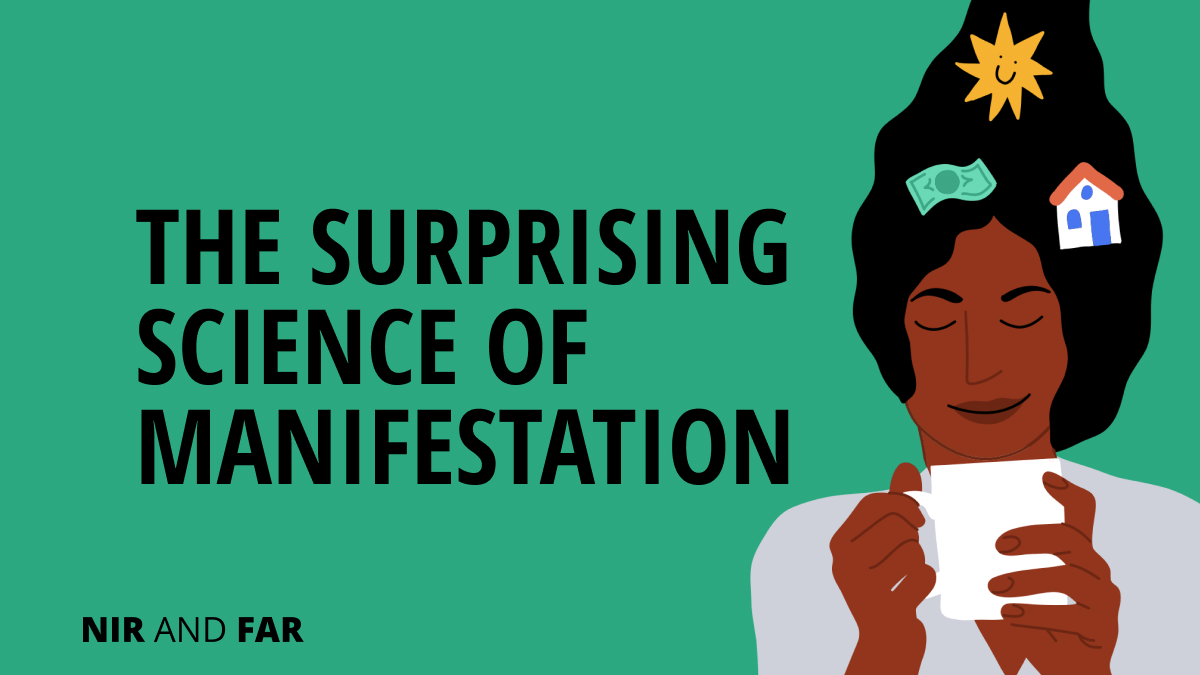Manifesting is bull. There, I said it.
According to Oprah, manifesting is bringing something tangible into your life through attraction and belief—i.e. if you think it, it will come.
It encourages people to bring a goal to life by making vision boards, writing in manifestation journals, chanting positive affirmations, and speaking it into existence.
Cue eye roll.
However, as much as I hate to admit it, manifesting may have benefits—but not for the reasons self-help gurus say it does.
As several scientific studies cited below reveal, good things happen to people who have a positive outlook, regardless of whether they channel the energy of the universe.
Manifesting teaches adherents to expect good things to happen, and when we open ourselves up to opportunities, we tend to see things we may otherwise miss.
In that respect alone, there is indeed a basis for the science of manifestation.
As much as I hate to admit it, #manifesting may have benefits—but not for the reasons self-help gurus say it does. Share on XIf You Look for Good, You’re More Likely to Find It
In many ways, expectations shape our reality.
This can work in your favor—or against you. While people with bright outlooks tend to focus more on opportunity and positive outcomes, those who tend to focus on the bad have far more trouble seeing the good.
“My experience is what I agree to attend to,” wrote William James, an American philosopher, historian, and psychologist, in his 19th-century book The Principles of Psychology, vol.1.
Interpretation: What we choose to give our attention to grows in our mind.
Focusing on the negative makes it loom large. Consider the implications this has on your life choices. You might not be able to see opportunities because you’re not looking for them. Or you might misinterpret an opportunity as a risk.
Perhaps you applied to a graduate school program because you wanted to switch careers, and you were accepted. Congrats! If you’re a pessimist, you’ll likely focus on the reasons not to follow through (e.g., quitting your full-time job or taking on debt). If you’re an optimist, you might place more stock in the reasons to go for it (e.g., pursuing a career you enjoy, earning a higher income).
Studies Show that Having a Positive Outlook Pays Off
It’s well-known that looking on the bright side has benefits. Optimists are more likely to be promoted. One study found that when compared to pessimists, “Visionary Work Optimists”—people in the top quartile for optimism as compared to their peers—are 40% more likely to get a promotion over the next year and six times more likely to be highly engaged at work.
Another study shows that optimists spend less effort job searching and are offered jobs more quickly compared to pessimists.
Yet another study shows optimistic people work harder, are more likely to remarry if they’ve divorced, and save more money.
It’s possible the Visionary Work Optimists were promoted not because they manifested it but because they believed they had influence over their potential promotion and thus did the work that put them ahead—unlike pessimists, who may think a job promotion is out of their hands.
Free Distraction Tracker
Reclaim control of your attention today.
Your email address is safe. I don't do the spam thing. Unsubscribe anytime. Privacy Policy.

Optimism, But Not Blind Optimism
Although a positive outlook is powerful, willful positivity and blind optimism can fail us. Sometimes persuading ourselves that something is going to go well can backfire by removing our motivation to achieve a goal.
In fact, while the study above found optimists save more money and work harder, it made a strong distinction between moderate optimists and extreme optimists: Moderate optimists display prudent financial habits and work longer hours, yet extreme optimists have short planning horizons and save less and work less. It suggests extreme optimists are overconfident in making decisions that aren’t wise.
This is where manifesting can get people into trouble…
By encouraging people to write down their desire 33 times in 3 days, or comment “yes” on an Instagram post to manifest $20,000, manifesting steps too close to blind optimism, a condition of oblivion that prevents consciousness or self-determination. Blind optimism can lead to inadequate preparation and convincing oneself of desired beliefs without reality checks.
Using the Science of Manifestation
To become more positive and optimistic, start by examining the origin of your current outlook.
Perspective and expectations are shaped by a variety of factors, including genetics and age, but mostly by our life experiences. Your childhood, your relationships, whether you had success early in life or not, all of these things influence whether you skew toward negativity or positivity.
In psychology, a “trapped prior” is a perception of reality that’s colored, or trapped, by past experiences.
To let go of trapped priors, release harmful perceptions about yourself. Many people avoid opportunities or perceived risks because, at some point in the past, they decided they were incapable, or they self-sabotaged by thinking something just wouldn’t work for them.
By letting go of past perceptions of what you can or can’t do, you’re treating yourself with kindness and giving yourself a better chance to thrive.
Next, understand that stepping outside your comfort zone seriously improves your life. You’ll always be able to think of a reason not to do something. But sometimes the outcome of a risk or a challenge might surprise you. It could turn out to be just what you needed to shake up your expectations.
Don’t simply manifest your goals. Instead, abolish negativity that’s tainting your outlook and see the opportunities right in front of you.
Related Articles
- Schedule Maker: a Google Sheet to Plan Your Week
- Habit Tracker Template in Google Sheets
- The Ultimate Core Values List: Your Guide to Personal Growth
- Timeboxing: Why It Works and How to Get Started in 2024
- An Illustrated Guide to the 4 Types of Liars
- Hyperbolic Discounting: Why You Make Terrible Life Choices
- Happiness Hack: This One Ritual Made Me Much Happier

